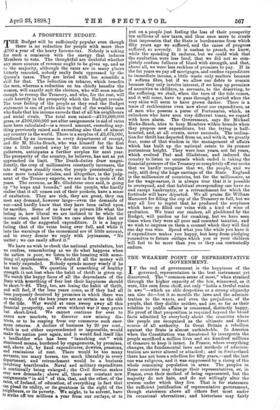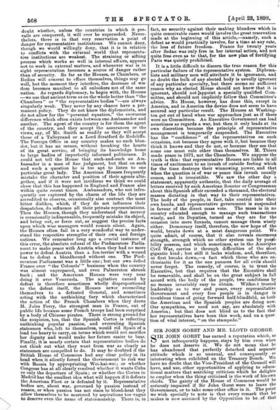THE WEAKEST POINT OF REPRESENTATIVE GOVERNMENT.
IF the end of government is the happiness of the governed, representation is the best instrument yet discovered. The " common-sense of most," when strained through the higher capacity of the few, winnowed, as it were, like corn from chaff, not only "holds a fretful realm in awe "—which an able despotism or a strong oligarchy can also do—but it so moulds the laws and the adminis- tration to the wants, and even the prejudices, of the people, that they dislike neither, and are, so far as their relation to public affairs is concerned, distinctly happy. No proof of that proposition is required beyond the broad facts admitted by everybody about the countries where the people are recognised as the ultimate and direct source of all authority. In Great Britain a rebellion against the State is almost unthinkable. In America when the Constitution was threatened by insurgents the people sacrificed a million lives and six hundred millions of treasure to keep it intact. In France, where everything changes, the fundamental laws and methods of adminis- tration are never altered or attacked ; and in Switzerland there has not been a rebellion for fifty years,—and the last one was religious, and it was suppressed by a rising of the whole remaining population in arms. The peoples in these countries may change their representatives, or, in France, even their method of being represented, but the majority do not hate, and do not willingly alter the system under which they live. That is for statesmen the sufficient justification of representative government, though statesmen above all others fret most under its occasional aberrations ; and historians may fairly doubt whether, unless the countries in which it pre- vails are conquered, it will ever be superseded. Never- theless, there is in that very reservation a point of danger for representative institutions. We cannot deny, though we would willingly deny, that it is in relation to conflicts with the external world that representa- tive institutions are weakest. The straining or sifting process which works so well in internal affairs, appears not to work in external matters, and whenever war is in sight representation becomes a source of danger rather than of security. So far as the Houses, or Chambers, or Bodies will consent to efface themselves, things may go well, but the moment they interfere, the decrease of wis- dom becomes manifest to all onlookers not of the same nation. As regards diplomacy, to begin with, the Houses —we use that ancient term as on the whole better than "the Chambers " or " the representative bodies "—are always singularly weak. They never by any chance have a per- manent policy. They do not know the diplomatists, and do not allow for the " personal equation," the enormous difference which often exists between one Ambassador and another. The agent of the country is for them the agent of the country, and they accept the assurances or the views, say, of Mr. Smith as readily as they will accept those of a Talleyrand or a Lord Stratford de Redcliffe. The Foreign Office in any country makes no such blun- der, but it has no means, without breaking the hearts of its great service, of bringing its knowledge home to large bodies of imperfectly informed politicians. It could not tell the House that such-and-such an Am- bassador is a man of fine judgment, but that on such and such a question he is too apt to listen to one particular great lady. The American Houses frequently mistake the character and position of their agents alto- gether, and if it were not invidious we think we could show that this has happened in England and France also within quite recent times. Ambassadors, who not infre- quently are captured by the charm of the life they are accredited to observe, occasionally also contract the most bitter dislikes, which, if they do not influence their despatches, do influence all their private representations. Then the Houses, though they understand that secrecy is occasionally indispensable, frequently mistake its object, and bring out, or force out, or suggest the precise facts upon which wise managers would remain silent. Again, the Houses often fail in a very wonderful way to under- stand the respective strengths of their own and foreign nations. We remember long ago a crucial instance of this error, the absolute refusal of the Piedmontese Parlia- ment to make peace with Austria when they had no more power to defeat Austria than a fox-terrier with a wound has to defeat a bloodhound without one. The Pied- montese Parliament was a little one ; but our own defied France over " the Colonels' " business when the country was almost unprepared, and even Palmerston shrank back ; and the American Houses were very near doing it over Venezuela. The agitation caused by defeat is therefore sometimes wholly disproportioned to the defeat itself, the Houses never reconciling themselves to a defeated General, and sometimes acting with the unthinking fury which characterised the action of the French Chambers when they drove M. Jules Ferry, the strongest man in France, out of public life because some French troops had been surprised by a body of Chinese pirates. There is strong ground for the suspicion, too, that the Spanish Cortes is reflecting unthinking popular passion, and overruling Spanish statesmen who, left to themselves, would rid Spain of a load too heavy to carry, on terms which would not sacrifice her dignity and would make her future easier to bear. Finally, it is nearly certain that representative bodies do not think out what they want from war as clearly as statesmen are compelled to do. It may be doubted if the British House of Commons had any clear policy in its head when it silently forced the Government to risk war with Russia by appropriating Wei-hai-wei ; or whether Congress has at all clearly resolved whether it wants Cuba or only the departure of Spain ; or whether the Cortes in Madrid has the smallest idea what will happen if it defeats the American Fleet or is defeated by it. Representative bodies are, about war, governed by passion instead of reason, or when passion has not risen to blood-heat they allow themselves to be mastered by aspirations too vague to deserve even the name of statesmanship. There is, in fact, no security against their making blunders which in quite conceivable cases would involve the great reservation made at the beginning of this article,—namely, such a defeat as would practically involve, for a time at any rate, the loss of future freedom. France for twenty years after Sedan was only free in her internal action, and not quite free even as to that, for the new plan of fortifying Paris was quietly prohibited.
It is a little difficult to discern the true reason for this particular failure of the representative system. Diploma- tists and military men will attribute it to ignorance, and no doubt the bulk of any elected body is usually ignorant of any particular specialty, but there seems no sufficient reason why an elected House should not know that it is ignorant, should not (appoint a specially qualified Com- mittee, and should not implicitly follow that Committee's advice. No House, however, has done this, except in America, and in America the device does not seem to have secured any particular result. The Houses at Washing- ton get out of hand when war approaches just as if there were no Committees. An Executive Government can lead sometimes as regards a war, but then it only leads at its own discretion because the principle of representative management is temporarily suspended. The Executive has the " confidence " of the representatives on such occasions, not because they agree with it, but because they think it knows and they do not, or because they see that some one must rule other than themselves. M. Thiers made peace in 1871, not the Chambers. We suppose the truth is this: that representative Houses are liable in all times of excitement to an inrush of outside feeling which for the time destroys their winnowing power, and that when the question is of war or peace this inrush usually comes, and is irresistible. We saw the other day a statement, apparently authentic, that the daily average of letters received by each American Senator or Congressman about this Spanish affair exceeded a thousand, the electoral masses dictating in that way to their representatives. The body of the people, in fact, take control into their own hands, and representative government is suspended in favour of the direct mass vote. The mass is in no country educated enough to manage such transactions wisely, and its Deputies, turned as they are for the occasion into mere funnels, cannot manage them wisely either. Democracy itself, therefore, the new hope of the world, breaks down at a most dangerous point. We quite admit, of course, that it also reveals enormoup strength, strength which no other system can by posi- bility possess, and which sometimes, as in the AmeriOan Civil War, carries it through difficulties of the uaiost gigantic kind ; but still it lacks wisdom, and, therefore, at first breaks down,—a fact which those who are en- thusiastic for it as the one panacea for all evils should never forget. The remedy, of course, is to trust the Executive, but that requires that the Executive shall be removable, and shall be on the great subject in full accord with the body of the people, two conditions by no means invariably easy to obtain. Without trusted leadership as to war and peace, every representative Government and every free people is in danger in troublous times of going forward half-blindfold, as both the American and the Spanish peoples are doing now. Our sympathies, we need not say, are absolutely with America; but that does not blind us to the fact that her representatives have been this week, and on a ques- tion of vital interest, " on the stampede."



































 Previous page
Previous page